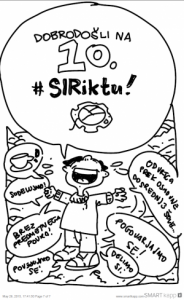Romana Vogrinčič, Gimnazija Murska Sobota, Murska Sobota
Digital competence, as one of basic learning competencies, is misunderstood as skill, comprising the knowledge of the use of information technology. As we can not imagine general functional literacy without knowing at least the basics grammar of the language in which we communicate, we can also not talk about functional digital literacy without knowing at least the basics of computing concepts – programming. In teaching informatics students are in an environment of SCRATCH learning basic concepts of programming on the manufacture of didactic computer games, which is intended for pupils of the first three classes of primary schools to consolidate their knowledge in mathematics. Objectives: after completion of the learning process … A student is able to … – define the concept of the algorithm and its basic building blocks – create an algorithm for simple problems. – argue why computational thinking is important for everyone. realizes … – basic programming concepts (looping, branching, variable, …) and is able to apply Scratch software tools and knows how to generate simple computer programmes. works on strategy … – and produces a working computer programme. – of his/her learning, assesses and gives constructive feedback to their classmates Formative assessment of a pupils progress was determined by: – assessing the prior knowledge of a student – joint setting of objectives and criteria – evidence of achievement – feedback – self-evaluation and peer evaluation In learning prcoces students were guided with the challenges and issues through the set of information problems. Using the elements of formative assessment skills lessons would be much more relaxed, because students are not afraid to make mistakes but can be used for learning and knowledge enhancement.
